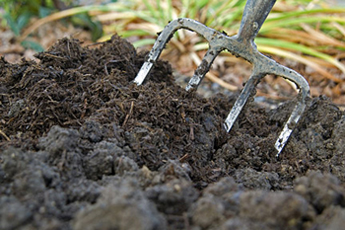There have been stories circulating around the internet for the past years on the historical reference of the expletive “shit”. If you haven’t heard the urban legend of the word and its origins, below is that has been around for years. I can’t verify the facts on this story but because it has shipping and freight references I thought it was humorous.


Title: Mushroom Compost
Description: Adding mushroom compost to garden borders at RHS garden Wisley, Surrey
Ship High in Transit Origin Story
Manure : The New World proposed many new challenges, the least be cultivating lands for crops. Before the large plantations and farmlands most of the land in the New World, the “Americas” , needed to be cultivated and primed for agriculture. Farmers and plantation owners needed lots of manure for fertilizer. The only place that had it in abundance was back in Europe. In the 16th and 17th centuries, everything had to be transported by ship and it was also before the invention of commercial fertilizers, so large shipments of manure were quite common.
It was shipped dry, because in dry form it weighed a lot less than when wet, but once water (at sea) hit it, not only did it become heavier, but the process of fermentation began again, of which a by product is methane gas of course.

As the stuff was stored below decks in bundles you can see what could (and did) happen. Methane began to build up below decks and the first time someone came below at night with a lantern, BOOOOM!


After that, the bundles of manure were always stamped with the instruction ‘ Stow high in transit ‘ on them, which meant for the sailors to stow it high enough off the lower decks so that any water that came into the hold would not touch this volatile cargo and start the production of methane.
Thus evolved the term ‘ S.H..I.T ‘ , (Stow High In Transit) which has come down through the centuries and is in use to this very day.
You probably did not know the true history of this word.
Neither did I.
I had always thought it was a golf term.
I have heard snippets of it over the years. It turns out it is an urban legend but of course we love it because it has to deal with freight and transport,….check out the actual history below
…..
“Analysis: Clever as all that may be, whoever came up with it doesn’t know shit about “shit.”
According to my dictionary, the word is much older than the 1800s, appearing in its earliest form about 1,000 years ago as the Old English verb scitan. That is confirmed by lexicographer Hugh Rawson in his bawdily edifying book, Wicked Words (New York: Crown, 1989), where it is further noted that the expletive is distantly related to words like science, schedule and shield, all of which derive from the Indo-European root skei-, meaning “to cut” or “to split.” You get the idea.
For most of its history “shit” was spelled “shite” (and sometimes still is), but the modern, four-letter spelling of the word can be found in texts dating as far back as the mid-1700s. It most certainly did not originate as an acronym used by 19th-century sailors.
Apropos that false premise, Rawson observes that “shit” has long been the subject of naughty wordplay, very often based on made-up acronyms on the order of “Ship High in Transit.” For example:
In the Army, officers who did not go to West Point have been known to disparage the military academy as the South Hudson Institute of Technology…. And if an angelic six-year-old asks, “Would you like to have some Sugar Honey Iced Tea?”, the safest course is to pretend that you have suddenly gone stone deaf.
Finally, all these stories are reminiscent of another specimen of folk etymology claiming that the F-word (another good, old-fashioned, all-purpose, four-letter expletive) originated as the acronym of “Fornication Under Consent of the King,” or, in another variant, “For Unlawful Carnal Knowledge.”
Suffice it to say, it’s all C.R.A.P.”
cited: http://urbanlegends.about.com/library/bl-s-word.htm
Manure…. An interesting “fact”

